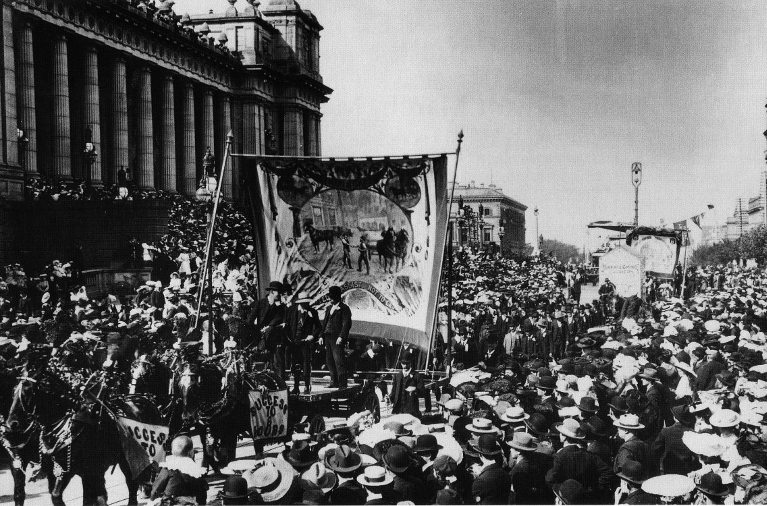I greatly enjoyed Brian Tokar’s reflections on the potentials, and pitfalls, of localism. He is right to point out that place-based activism has seen an upsurge, but also to acknowledge that localism has a dark side, as seen in the call for “local control” by reactionary movements. Further, localism is often criticized for being unable to engage with issues which require action at national and multi-lateral levels, such as nationalism, free trade agreements, or climate change. To this concern, Tokar offers the philosophy and political theory of social ecology, which can help us address these inherent limits of localism. I agree with the fundamental need for democratic and place-based communities to confederate and scale up their action to the “glocal” level. I also agree that a commitment to confederating and establishing common principles can counter the rise of racist, nationalist localism.
I would like to reflect briefly on three points, which I hope add to Tokar’s argument. First, all meaningful action is local. When we talk about local vs. global action, we often end up stuck in dualisms. Advocates of local action are often met with complaints that their actions fail to scale up and address the “big problem”: a global, flexible, and mobile capitalist system. This argument was succinctly framed by Nick Srnicek and Alex Williams in their book Inventing the Future: Postcapitalism and a World Without Work, in which they called the recent tendency of progressives to limit themselves to localism “folk politics.” The implication is that we can only focus on the big things like the flow of capital, national politics, or taking control over the means of production on a larger scale, if we want to affect change.
Indeed, as Tokar underscores, localism fails without “scaling up” through, for example, multi-level and multi-system collaboration, resource-sharing, and confederation. In addition, I would ask us to look back at meaningful change (revolutions, if you will) from the past. Most of what gives us the slightest comfort under capitalism—limits to the work-week, a minimum wage, health care, basic protections from employers and landlords, child support, and free public school—has been won by labor movements. The principle of labor organizing is simple: employees talk about their problems together and then make demands from their employer. When the employer (inevitably) refuses, they stop working. The union supports workers with resources and legal aid. To get them to work again, the employer is forced to agree to their demands. Seeing the benefits of this strategy, more workers join the union, and unions develop the power to make demands at higher and higher levels—eventually forcing concessions from government under threat of general strike.
The working class’s ability to get together locally, and to collectively do politics, has shaped history, exacting entitlements and rights from capital that have made our lives tolerable. This is local action scaled up to the global. Capitalism might operate globally, but all meaningful action against it is by people who live and work in a place. Therefore, arguing that place-based action ultimately cannot challenge capitalism fails to understand that it, in fact, is the very beginning and basic building block of wider, scaled-up resistance.
Second, place-based and municipalist movements must make clear demands that block capital. In my experience, municipalist movements have a tendency to depoliticize themselves in an effort to appear more accessible. Democracy, local control, citizen engagement—what’s not to like? The truth is that as soon as local control is strengthened, investors and industries have all the power to leave and do business elsewhere. Municipal governments—many of those Tokar cites for developing admirable climate action plans and solidarity policies—bend over backwards to accommodate our new tech overlords, companies like Amazon, Google, and Microsoft.
Drawing again on the example of the labor movement, demands were won from capitalists and politicians, not by asking nicely, but by withdrawing their only tool—their labor—and thus taking away the capitalists’ ability to make a profit. In general, the power of the elite cannot be confronted by timidly asking or jumping to compromises. It can only be confronted by hampering the source of their power in the first place: the ability to make a profit. Like past movements, municipalist movements must take a combative stance that withdraws capital’s ability to make a profit. Place-based movements like Transition Towns, ecovillages, and urbanist-style “green development” have largely failed to understand the role of conflict and uneven power relations in shaping local politics, and the need to enter into a combative relationship with capital and its allied political leaders. Municipalist movements must unflinchingly stand up against capital.
I have cited the labor movement as an important predecessor, yet it is now at a historical low point (though we are now seeing some revitalization, especially in the United States). Labor in the West has diminished capacity to make and win significant demands, mainly because of the decimation of industrialized labor due to successive free trade agreements, and the fragmentation of the workplace into smaller units with the shift to the service economy. Sectors that are seeing a revitalized labor movement tend to have large shared employers, e.g., government employees like teachers, postal workers, and nurses, or those working in the logistics industry, e.g., truck drivers, port workers, and Amazon workers.
This leads me to my third point, which is that municipalist movements are in a perfect position to assume the mantle of the workers’ movements as the agents of history, while building alliances with them. With most capital today invested in real estate and cities, blocking developments, demanding investments in amenities, and refusing to accept the privatization of public space can be key strategies for our new democratic, municipalist movements. We can, and should, force capitalists to the bargaining table, and the best way to do so is to organize locally to take control of local governments, or, barring that, force them to resist developers and investors.
My third point is more speculative. This course of action will inevitably bring about a series of crises and shocks to the capitalist system, with consequent backlash. As local movements gather, confederate, and challenge the power of capital and the state at different levels, there will be crackdowns, violence, embargos, and refusal to provide aid. (Witness Donald Trump’s threats to withdraw federal aid to “solidarity cities” and cities increasingly affected by climate change.) In preparation for this, what relationships of care, alliances between movements, networks of mutual aid, and strategies of resistance can we start developing now? This will be, I believe, an important part of municipalist action to come.





